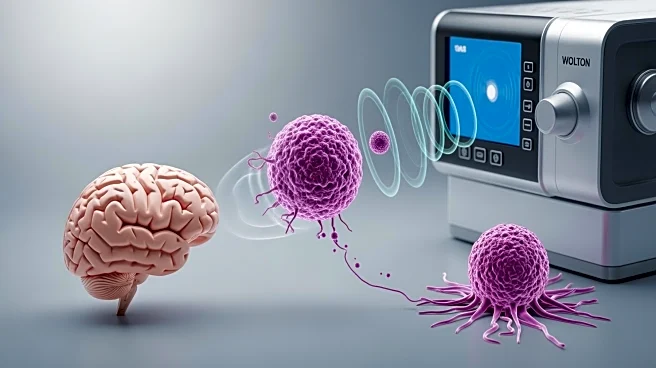What's Happening?
Focused ultrasound technology is emerging as a promising treatment for conditions like Alzheimer's disease and cancer. This technology uses sound waves at frequencies above human hearing to target specific areas in the body, potentially improving drug
delivery to the brain and stimulating immune responses against cancer. Researchers have found that focused ultrasound can temporarily open the blood-brain barrier, allowing drugs to penetrate the brain. Additionally, it can turn tumors into debris, which then flows to lymph nodes, initiating an immune response against cancer. Clinical trials are underway to test these applications, including treatments for glioblastoma and advanced melanoma.
Why It's Important?
The ability to use focused ultrasound to open the blood-brain barrier and enhance drug delivery could revolutionize the treatment of neurological disorders, including Alzheimer's disease. This technology offers a non-invasive method to improve the efficacy of existing therapies, potentially leading to better outcomes for patients. In oncology, focused ultrasound's ability to stimulate immune responses against cancer could provide a new avenue for immunotherapy, particularly for tumors that are resistant to traditional treatments. These advancements could significantly impact public health by offering new treatment options for some of the most challenging diseases.
What's Next?
Ongoing clinical trials will continue to explore the efficacy and safety of focused ultrasound in treating Alzheimer's and cancer. Researchers are also investigating its potential in treating rare diseases and improving gene therapy delivery to the brain. As the technology advances, it may become a standard part of treatment protocols for various conditions, leading to broader adoption in clinical settings. Collaboration between researchers, healthcare providers, and technology developers will be crucial in realizing the full potential of focused ultrasound.
Beyond the Headlines
Focused ultrasound represents a shift towards non-invasive medical treatments, reducing the need for surgical interventions and minimizing patient recovery time. This technology could lead to a paradigm shift in how diseases are treated, emphasizing precision medicine and targeted therapies. The integration of focused ultrasound with other emerging technologies, such as gene therapy, could further enhance its therapeutic potential, offering hope for patients with previously untreatable conditions.















